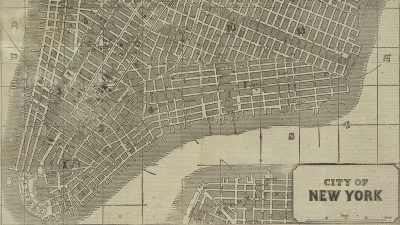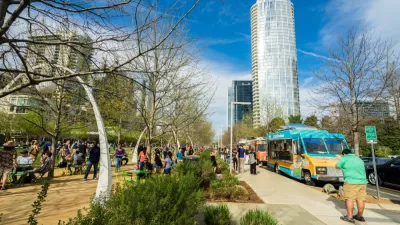The city's proposed comprehensive planning bill could create a more equitable and collaborative planning process

The New York city council's proposed comprehensive long-term planning bill, write Danny Pearlstein and David Tipson in the Gotham Gazette, "has the potential to foster a more equitable and rational planning process to guide land-use changes in New York City." However, the authors caution that "comprehensive planning is about much more than land use" and involved decisions that affect "education, transportation, public health and safety, sustainability," and all aspects of city life. Comprehensive planning could end the "piecemeal" decision-making that has crippled the city's development policies.
The authors argue that the lack of meaningful, comprehensive design guidelines lead to a host of urban problems such as overcrowded schools, excessive traffic and damage to local roads, and dead streetscapes. A "formal process that provide[s] meaningful opportunities for the community to engage in planning" can address these issues and bring forward important community concerns early on. Comprehensive planning promises a pathway to adherence to "clear and immovable guiding principles such as racial justice, reduction of segregation in schools and neighborhoods, net creation of affordable housing, and prioritization of public transit and pedestrian safety and accessibility" through multi-agency coordination and collaboration.
"New York City’s exceptional size, complexity, and competing needs only increase the necessity of a formal and predictable planning process." The proposed amendments to the comprehensive plan would "enshrine better public transit," "give local communities a real opportunity to plan proactively without being allowed to override the public good of the city as a whole," and "ensure that the plan will actually guide official decision-making."
FULL STORY: Comprehensive Planning is Not Just About Housing and Zoning

Alabama: Trump Terminates Settlements for Black Communities Harmed By Raw Sewage
Trump deemed the landmark civil rights agreement “illegal DEI and environmental justice policy.”

Planetizen Federal Action Tracker
A weekly monitor of how Trump’s orders and actions are impacting planners and planning in America.

The 120 Year Old Tiny Home Villages That Sheltered San Francisco’s Earthquake Refugees
More than a century ago, San Francisco mobilized to house thousands of residents displaced by the 1906 earthquake. Could their strategy offer a model for the present?

In Both Crashes and Crime, Public Transportation is Far Safer than Driving
Contrary to popular assumptions, public transportation has far lower crash and crime rates than automobile travel. For safer communities, improve and encourage transit travel.

Report: Zoning Reforms Should Complement Nashville’s Ambitious Transit Plan
Without reform, restrictive zoning codes will limit the impact of the city’s planned transit expansion and could exclude some of the residents who depend on transit the most.

Judge Orders Release of Frozen IRA, IIJA Funding
The decision is a victory for environmental groups who charged that freezing funds for critical infrastructure and disaster response programs caused “real and irreparable harm” to communities.
Urban Design for Planners 1: Software Tools
This six-course series explores essential urban design concepts using open source software and equips planners with the tools they need to participate fully in the urban design process.
Planning for Universal Design
Learn the tools for implementing Universal Design in planning regulations.
Clanton & Associates, Inc.
Jessamine County Fiscal Court
Institute for Housing and Urban Development Studies (IHS)
City of Grandview
Harvard GSD Executive Education
Toledo-Lucas County Plan Commissions
Salt Lake City
NYU Wagner Graduate School of Public Service





























